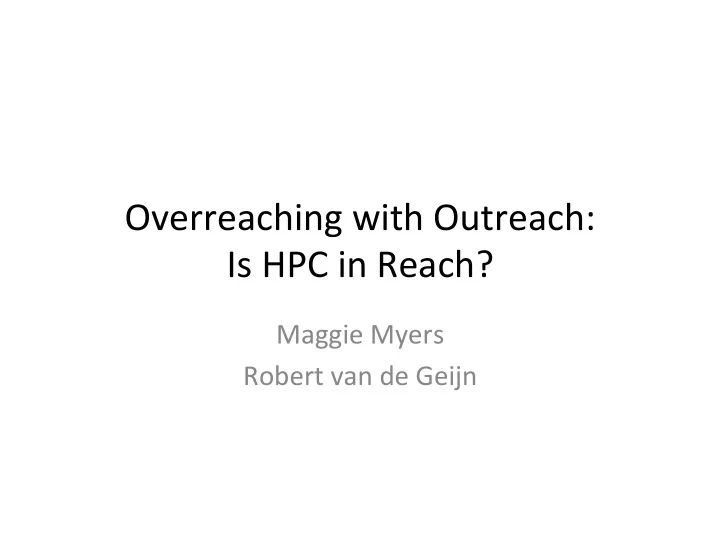

Overreaching with Outreach: Is HPC in Reach? Maggie Myers Robert van de Geijn
Are we crazy? Three Massive Open Online Courses: • Linear Algebra: FoundaEons to FronEers • LAFF-On Programming for Correctness • (LAFF-On) Programming for HPC EducaEng the world about our world.
Insights for HPC we want to share • When presenEng algorithms, abstract away from details. • When represenEng algorithms in code, use APIs. • When opEmizing or parallelizing, don’t just start with legacy code. Derive families of algorithms. • When implemenEng soQware, layer. • When sharing gained insights use the simplest examples.
Where are we in our journey? • LAFF – Sixth offering on edX. • LAFF-On Programming for Correctness – First offered Spring 2017 • Programming for HPC – Planning
What is LAFF? • Linear Algebra: FoundaEons to FronEers (LAFF) • A full semester class • Connects the abstracEons in mathemaEcs with algorithms and their instanEaEon in code. – Layering of matrix-matrix/matrix-vector/vector-vector operaEons linked to layering with BLAS. • Targets novices and those who want a refresher. • Enriches fundamental linear algebra with HPC issues. • Introduces FLAME notaEon and, in enrichments, acquaints the world with our research.
Linear Algebra: Linear Algebra: Foundations to Fr Foundations to Frontiers ontiers You will learn to Slice and Dice ² Recognize, apply, verify, and make Transform and Solve connecEons between properEes of Abstract vectors and their operaEons ² Recognize, apply, and verify including geometric properEes of linear ² Develop and evaluate a variety of interpretaEons, orthogonality, transformaEons, including their algorithms for determining the length, vector algebra, and connecEon to matrices and systems soluEons of systems. representaEons as linear of linear equaEons. combinaEons of unit basis vector. ² Understand and apply noEons such ² Determine soluEons for systems of as span, column space, null space, ² Develop and evaluate algorithms equaEons by applying a variety of rank, and linear independence in for matrix and vector operaEons. methods including Gaussian the context of vector spaces and eliminaEon as well as various LU subspaces. ² Make use of decomposiEon and and QR factorizaEon methods, and blocking methods as well as compare and contrast the different recognize, develop and apply ² Recognize, develop, and apply approaches. special characterisEcs of matrices various characterizaEons of linear including whether a matrix is independence. ² Find eigenvalues and eigenvectors triangular, symmetric, diagonal, of a matrix. and inverEble. ² Create a small library of basic linear algebra subrouEnes.
• Heartbeat Spring 2014 How’s it goin’? Spring 2015 Summer 2015 Fall 2016 Spring 2016 Fall 2017
How’s it goin’? Fall 2016 Spring 2016 Fall 2017
LAFF-On Programming for Correctness • For many HPC applicaEons, including dense matrix computaEons, implementaEons of key operaEons are loop-based. • Classic techniques developed in the 1960s by Dijkstra et al. use a loop invariant and the Principle of MathemaEcal InducEon to prove a loop correct. • FLAME NotaEon hides indices and facilitates formal derivaEon of families of algorithms. • A priori determinaEon of loop invariants. • Important for HPC: best algorithm for situaEon can be chosen.
LAFF-On Programming for Correctness Annotate programs with Avoid indexing errors by avoiding asserEons about the states of indexing. variables. Determine loop invariants a Prove programs correct with Hoare triples and weakest priori . precondiEons. Develop families of algorithms Apply goal oriented programming for matrix and vector operaEons. techniques to derive programs hand-in-hand with their proofs of correctness
How’s it goin’? On campus course First offering First six weeks
The beat goes on… And now (LAFF-On) Programming for HPC • Illustrate issues in HPC with simple example: matrix-matrix mulEplicaEon (gemm)
Envision three parts: • OpEmizing gemm (for single core and mulEcore) • Data movement on distributed memory architectures (MPI and collecEve communicaEon) • Parallelizing gemm to distributed memory
Resources K. Goto and R. van de Geijn. Anatomy of High-Performance Matrix • Mul7plica7on. ACM TOMS, 2008. F. Van Zee and R. van de Geijn. BLIS: A Framework for Rapidly • Instan7a7ng BLAS Func7onality. ACM TOMS, 2015. T. Smith et al. Anatomy of High-Performance Many-Threaded Matrix • Mul7plica7on. IPDPS 2014. J. Huang et al. Strassen's Algorithm Reloaded. SC'16 • hlps://github.com/flame/ how-to-opEmize-gemm/wiki • hlps://github.com/flame/ blislab • E. Chan et al. Collec7ve communica7on: theory, prac7ce, and • experience. C&C:P&E, 2007. M. Schatz et al. Parallel Matrix Mul7plica7on: A Systema7c Journey. • SISC, 2016.
Challenges • Funding • Access to interesEng architectures • Keeping our sanity
Summary • MOOCs are a way for us to reach a broad audience. • Benefits? – Open source, open plaporm, open educaEon, open HPC? – Crowd source opEmizing DLA? – Demonstrate broad impact to funders! • Can they democraEze HPC?
Are we Crazy?
Acknowledgments Linear Algebra: FoundaEons to FronEers ParEally funded by • – First NSF SSI grant – University of Texas System LAFF-On Programming for Correctness ParEally funded by • – Second NSF SSI grant – A giQ from Mathworks – Profit sharing with edX (LAFF-On) Programming for HPC ParEally funded by • – NSF grant on Strassen’s algorithm – …
Recommend
More recommend